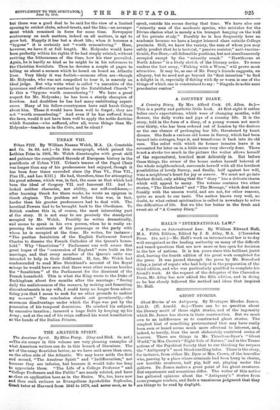Urban VIII. By William Nassau Welch, M.A. (A. Constable and
Co. as. 6d. net.)—In this monograph, which gained the Lothian Prize in 1903, Mr. Welch disentangles with great skill and patience the complicated threads of European history in the pontificate of Urban VIII. Urban's tenure of the Papal Chair was longer than any of his predecessors had enjoyed, though it has been four times exceeded since (by Pius VI., Pius VII., Pius IX., and Leo XIII.) He had, therefore, time for attempting his great scheme, which was, in fact, the same as that which bad been the ideal of Gregory VII. and Innocent III. And he lacked neither character, nor ability, nor self-confidence,— after learning Greek for three weeks, he wrote an epigram in Greek elegiacs. The problem set before him was, in fact, harder than his greater predecessors had to deal with. The heretical Powers had to be brought back to the Obedience. To British readers this is, of course, the most interesting part of the story. It is not easy to see precisely the standpoint occupied by Mr. Welch. Possibly he writes dramatically, and seems to speak in his own person, when he is really ex- pressing the sentiments of the personage or the party with whom he is occupied at the time. He writes, for instance : "The puritan fanaticism of the English Parliament forced Charles to dismiss the French Catholics of the Queen's house- hold." Why "fanaticism" ? Parliament was well aware that great hopes of the "conversion of England" were built on the marriage, and that every member of the Queen's suite was intended to help in their fulfilment. If, too, Mr. Welch had condescended to read Miss Strickland's account of the Royal Waage he would have seen that there were other reasons besides the "fanaticism" of the Parliament for the dismissal of the French household. This is what the Xing wrote to the Duke of Buckingham about five months after the marriage : " Seeing daily the maliciousness of the monsers, by making and fomenting discontentments in my wife, I could tarry no longer from adver- tising you that I mean to seek for no other grounds to cashier my monsers." One conclusion stands out prominently,—the enormous disadvantage under which the Pope was put by the possession of his temporal dominions. He crushed his subjects by excessive taxation ; incurred a huge Debt by keeping up his Army; and at the end of his reign suffered his worst humiliation at the hands of the Italian Princes.


















































 Previous page
Previous page